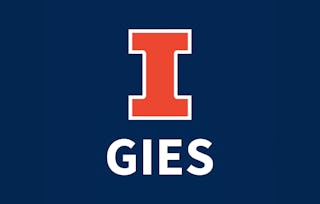This course provides a brief introduction to the fundamentals of finance, emphasizing their application to a wide variety of real-world situations spanning personal finance, corporate decision-making, and financial intermediation. Key concepts and applications include: time value of money, risk-return tradeoff, cost of capital, interest rates, retirement savings, mortgage financing, auto leasing, capital budgeting, asset valuation, discounted cash flow (DCF) analysis, net present value, internal rate of return, hurdle rate, payback period.

Ends soon: Gain next-level skills with Coursera Plus for $199 (regularly $399). Save now.

Introduction to Corporate Finance
This course is part of multiple programs.

Instructor: Michael R Roberts
269,871 already enrolled
Included with
(6,381 reviews)
Skills you'll gain
Details to know

Add to your LinkedIn profile
8 assignments
See how employees at top companies are mastering in-demand skills

Build your subject-matter expertise
- Learn new concepts from industry experts
- Gain a foundational understanding of a subject or tool
- Develop job-relevant skills with hands-on projects
- Earn a shareable career certificate

There are 4 modules in this course
Welcome to Introduction to Corporate Finance! This first module will introduce you to one of the most important foundational concepts in Finance, the time value of money. Before diving into the Video lectures, I encourage you to take a look at the brief pre-reading for the course. Specifically, have a look at “Big Picture Course Motivation,” for additional motivation and context for the course, “Time Value of Money Overview,” for a motivation and context for our first topic, and “Quiz Problem Answer Input.” This last note is particularly important to avoid confusion with the problem sets. Then, go to the Video Lectures and start learning Finance!
What's included
4 videos6 readings2 assignments
In this module, we wrap up the Time Value of Money topic with a discussion of inflation before moving on to our second topic, Interest Rates, and introducing our third topic, Discounted Cash Flow Analysis. By the end of this module, you should feel comfortable with discounting and compounding arbitrary cash flow streams in order to value different claims and make better financial decisions.
What's included
4 videos1 reading2 assignments
This module continues our discussion of discounted cash flow analysis by way of a capital budgeting case. (You might want to download or view the Excel file, “Tablet Case Spreadsheet.xlsx,” that I use in the lectures, but it is not necessary for understanding the material.) By the end of this module, you should feel comfortable valuing claims and making financing decisions in which the timing of the cash flows and compounding of interest is arbitrary (e.g., annual, semi-quarterly, monthly, etc.). Having worked through the problems, you should also be more comfortable with real world financial decision making related to retirement savings, home financing and refinancing, auto leases, and other scenarios.
What's included
3 videos2 readings2 assignments
This module closes out our discussion of discounted cash flow analysis and caps off the course with a discussion of return on investment. By the end of this module, you should feel comfortable with the notion of free cash flow and the ability to apply a set of forecast drivers to project free cash flows into the future. These are some of the elements of a basic financial model, which we will use to come to a decision about the tablet project and to analyze the assumptions behind our valuation.
What's included
3 videos1 reading2 assignments
Earn a career certificate
Add this credential to your LinkedIn profile, resume, or CV. Share it on social media and in your performance review.
Instructor

Offered by
Explore more from Finance
 Status: Preview
Status: PreviewUniversity of Illinois Urbana-Champaign
 Status: Free Trial
Status: Free TrialUniversity of Pennsylvania
 Status: Free Trial
Status: Free TrialRice University
 Status: Free Trial
Status: Free TrialCorporate Finance Institute
Why people choose Coursera for their career




Learner reviews
6,381 reviews
- 5 stars
70.34%
- 4 stars
21.56%
- 3 stars
5.40%
- 2 stars
1.53%
- 1 star
1.14%
Showing 3 of 6381
Reviewed on Nov 12, 2022
Excellent and concise course! I've dealt with IRR and NPV for my job for years and did not fully understand their origins and limitations, and this course helped clearly articulate that for me.
Reviewed on Dec 15, 2018
I REALLY LOVED THIS COURSE. IN FACT I ASK THE MANAGEMENT TO PLEASE COME UP WITH MORE ADVANCED COURSES IN THIS AREA.ALSO, I REALLY LIKED THE WAY THE FACULTY HAS EXPLAINED THE CONCEPT. CHEERS!
Reviewed on Sep 26, 2021
An excellent course overall. I really enjoyed the learning experience and look forward to more courses from Wharton. Special thanks to professor Michael Roberts for providing great value in 1 course.
Frequently asked questions
To access the course materials, assignments and to earn a Certificate, you will need to purchase the Certificate experience when you enroll in a course. You can try a Free Trial instead, or apply for Financial Aid. The course may offer 'Full Course, No Certificate' instead. This option lets you see all course materials, submit required assessments, and get a final grade. This also means that you will not be able to purchase a Certificate experience.
When you enroll in the course, you get access to all of the courses in the Specialization, and you earn a certificate when you complete the work. Your electronic Certificate will be added to your Accomplishments page - from there, you can print your Certificate or add it to your LinkedIn profile.
Yes. In select learning programs, you can apply for financial aid or a scholarship if you can’t afford the enrollment fee. If fin aid or scholarship is available for your learning program selection, you’ll find a link to apply on the description page.
More questions
Financial aid available,





